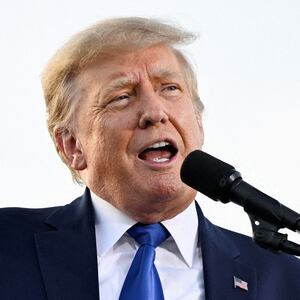CINCINNATI, Ohio—Just weeks after former President Donald Trump gave him his tepid endorsement, one-time author and venture capitalist turned Republican Senate candidate J.D. Vance won the GOP nomination for Ohio’s Senate seat Tuesday night, further strengthening the argument that Trump is still the kingmaker in the Republican Party.
Vance claimed victory in a strikingly populist and pugilistic speech just minutes after the Associated Press called the race and about two hours after polls closed on Tuesday.
“They wanted a story that said this campaign would be death of the America First agenda,” Vance said. “It ain’t the death of the America First agenda.”
But Vance, speaking onstage alongside his wife, Usha Vance—a former clerk to Chief Justice John Roberts and a rare presence on the campaign trail—was also quick to signal that he wanted to heal the wounds of a brutal and, at times, ugly primary.
He complimented each of his competitors, and applauded “most of” the people of Ohio as “good.” But he also said the Democratic Party should be jailed for what he characterized as their collusion with the Sackler family and Mexican cartels in the opioid epidemic that has ravaged his home state.
The Yale Law grad also drew focus on his speech to his next opponent, Rep. Tim Ryan, a moderate whom Vance labeled a “Trump Democrat” and an example of “the worst of politics” in the last two decades.
Vance, who doubtlessly owes his victory to Trump, also extended his graces to several MAGA allies who came to his side in the campaign’s final weeks. They included Rep. Marjorie Taylor Greene (R-GA), Fox News talk show host Tucker Carlson, conspiracy theorist Charlie Kirk, and Donald Trump Jr. He did not mention Rep. Matt Gaetz (R-FL), who teamed up with Vance and Greene at recent rallies and who is under federal investigation for sex crimes.
Vance’s victory shows the weight that Trump’s blessing can still have in a red state—Trump defeated President Joe Biden in Ohio by 8 percentage points—both with voters and with donors.
Vance spent most of his Senate campaign toiling at the back of the pack of Republican candidates, unable to break through with Ohio voters and lagging behind businessman Mike Gibbons and former state treasurer Josh Mandel—the latter of whom desperately courted the MAGA vote with even more outlandish and overt appeals to Trump than even Vance was willing to muster.
But it was Vance who ultimately secured Trump’s blessing. And once he got Trump’s endorsement, Vance surged to the front of the polls for the first time in the contest and couldn’t be caught.
At the onset, the Republican race to replace retiring Sen. Rob Portman turned into an Apprentice-like contest for Trump’s nod—with every candidate issuing bombastic statements, taking trips to Mar-a-Lago, and appearing with friends and allies of Trumpworld.
That “race to the bottom” manifested itself in months of infighting, cynicism, and increasingly transparent appeals to win the hearts of a determinative MAGA base. The finger-pointing engendered a skepticism among Ohio Republicans, reflected in poll after poll as a persistent uncertainty, with the majority of supporters behind any given candidate signaling that they were prepared to change their minds before Election Day.
Trump himself captured that uncertainty—intentionally or not—at a rally the weekend before votes were cast by declaring his allegiance to a Vance-Mandel chimera: “J.D. Mandel.”
When Trump later tried to set the record straight in a joint telerally with Vance, he actually reasserted his apparent political pantheism, admitting to the audience that he liked all of the candidates, congratulating himself for the “courage” it required to finally weigh in on the “mess” that the toxic campaign had created.
In testament to the effects of that toxicity, the lone moderate holdout, state senator Matt Dolan, gathered momentum only in the weeks following Trump’s endorsement, running second behind Vance with just days to go. While Dolan’s home-stretch burst ultimately didn’t outstrip the velocity Vance gained from Trump’s endorsement, it was politically significant, signaling that a not insignificant contingent of the Ohio GOP base was willing to repudiate the former president.
Initially, Vance seemed like an unlikely choice, given his record of insulting Trump both in public and in private. Before it was scrubbed early in the primary race, Vance’s Twitter feed was full of negative comments about the former president in the lead up to and the aftermath of the 2016 election, even referring to him in one conversation with a former law school classmate as “America’s Hilter.” But with the help of Trump ally and Vance-backer billionaire Peter Theil, the Hillbilly Elegy author was able to work himself back into the former president’s good graces.
Vance will now face off with Rep. Tim Ryan (D-OH), in what promises to be one of the more expensive and contentious Senate races of the general election.









